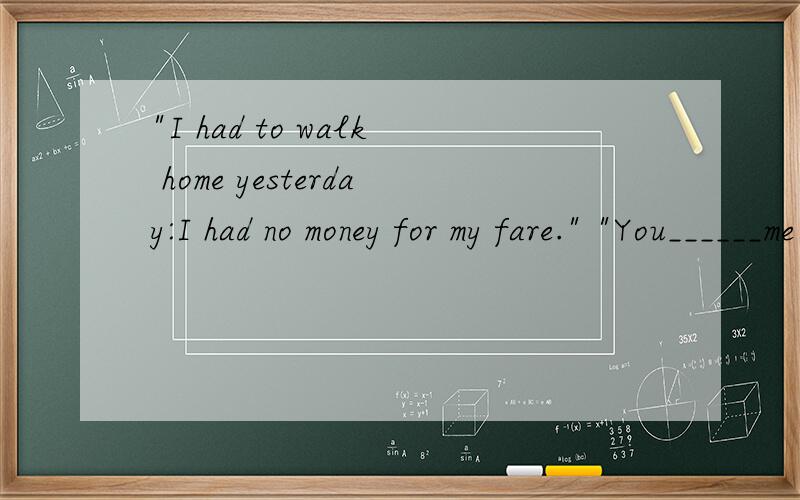"I had to walk home yesterday:I had no money for my fare." "You______me l I could have lent you the money!" (2 分)A.ought to tellB.must have toldC.must tellD.should have told
来源:学生作业帮助网 编辑:作业帮 时间:2024/06/30 05:18:51

x�Ց�N�@�_e�(�8VV��\xN�`Ku�Qb�rK�(��B��
!|I�2�C�"Hy�z9���jE@� ��zfv����*�dl
U���j~�et(�K�kj�SX�2Ȱ�^�/,:Լ
�Al����
fa�٦F
��Y
������1���|���3{ɰOK7͙x�.Xa��L�s�t�`��
��B>���w
\���e22����#�K*�s�i��8u��
�7b��������6��:�7E�n�o��~��u ���K�r��r�S�:�y%��.��ʼu��]ᶱ���u��
��v[����/܆w�
��k� ���l|��4���L� n�D�����K��O���$
95�||E���iiJ2|���s�Gع"�Ѡ�'T���w��ێ� � ��QG(�
�����@�����͍��kw�H�H
"I had to walk home yesterday:I had no money for my fare." "You______me l I could have lent you the money!" (2 分)A.ought to tellB.must have toldC.must tellD.should have told
"I had to walk home yesterday:I had no money for my fare." "You______me l I could have lent you the money!" (2 分)
A.ought to tell
B.must have told
C.must tell
D.should have told
"I had to walk home yesterday:I had no money for my fare." "You______me l I could have lent you the money!" (2 分)A.ought to tellB.must have toldC.must tellD.should have told
D
表示对过去事情的假设,所以用 should+一般现在完成时
should have done表示本应该做某事
这句话翻译为:如果你告诉我的话,我可以借钱给你的
A
D
我昨天走回家的,因为我没钱买票
你本该告诉我的,我可以借给你!
D
表示对过去事情的假设,所以用 should+一般现在完成时
这句话翻译为:如果你告诉我的话,我可以借钱给你的
D
They a_______that they had to walk home
I didn’t have enough money _______ a taxi,so I had to walk _______ home
I had to _____(walk) to school.
修改病句 I can walk to home
I used to walk home,but s______ I rode home.
there____no buses ,we had to walk home after work yesterday
having missed the bus,we had to walk home.
I didn’t have enough money _______ a taxi,so I had to walk _______ home.A.to;to B.for;to C.to;/ D.for;/
_.I had to walk home(_).I had to walk homeA.There was no bus B.There being no busC.There were no busesD.There was not a bus我也觉得选A。可我们老师是说选B。
是walk home 还是walk to home?
they had to walk home at last.(改为一般疑问句)( )they( )( ) walk home at last.
like,to,i,walk,after,home,school(组句)
walk I to the in Make's morning home造句
walk I to the in Make's morning home造句
I often walk back to home (改错)
i don't want to walk home是那么意思?
I ___ all the money shopping,so I had to walk home yesterday.A.to away B.run out of C.toI ___ all the money shopping,so I had to walk home yesterday.A.to away B.run out of C.to off D.got out of 选B的话,没过去式,你说选哪个?
英语句型转换问题Because there was no bus,we had to walk home.There ___ no bus,we had to walk home.